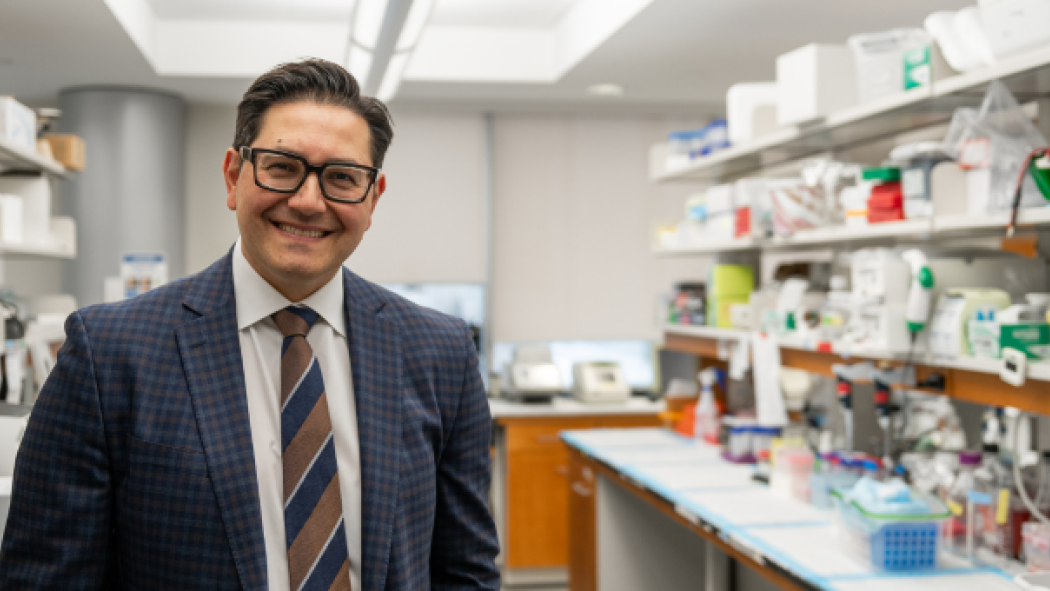
April 10, 2024
At 15, Peter Lanis learned his kidneys were failing. The once vivacious teen was gaunt, tired and unable to eat. Every other day, for about three hours, he was connected to a dialysis machine that cleaned his blood and removed excess fluid.
Lanis needed a kidney transplant. His mother wasn’t a match, nor was his older brother. But his identical twin brother was an ideal living donor. Once the twins turned 18, the age of consent, the successful surgery proceeded – the first time a kidney transplant between identical twins was performed at London Health Sciences Centre’s (LHSC) University Hospital.
“I've had time on my side. That's what I got back, time,” said Lanis, now 50. Time to travel, to pursue a successful career, to be a dad to a now one-year-old girl.
Lanis’ surgeon was Dr. Andrew Lazarovits, who died of cancer in 1999. He was 43.
Now, the new Andrew Lazarovits Chair in Immunobiology and Transplantation at the Schulich School of Medicine & Dentistry at Western University and LHSC will honour him and accelerate organ transplant research.
Lasting legacy
It is the Lanis twins who Dr. Anthony Jevnikar, Scientific Director of the Matthew Mailing Centre for Translational Transplant Studies at LHSC and Schulich Medicine professor, recalls when remembering Lazarovits’ “relentless” pursuit of knowledge to improve patient care.
The colleagues were discussing whether Lanis needed immunosuppressant drugs (also known as anti-rejection drugs), given the kidney donor was his twin. While typical with transplant surgery, the drugs could damage Lanis’ kidneys over the long term. That’s when Lazarovits cold-called Nobel Prize winner Dr. Joseph Murray, the first surgeon to successfully perform a renal transplant.
That conversation resulted in the team moving ahead with transplantation without immunosuppressants, a decision Lanis credits as lifesaving and life-changing.
Lanis vividly remembers how his life changed post-surgery when he no longer required dialysis. Suddenly, he could go anywhere he wanted. He could “jump on a plane” or walk down the street without feeling weak or exhausted. He could pursue his dreams.
Jevnikar describes Lanis’ long-term, positive outcome as “a miracle.”
Lazarovits would go on to make a discovery that may ultimately end the need for all transplant recipients to take anti-rejection drugs. He received the Kidney Foundation of Canada Medal for Research Excellence for the breakthrough – identifying an antibody that targets and disarms immune cells responsible for organ rejection.
Patient-centred research
The new clinician-scientist position honouring Lazarovits is funded by Lawson Health Research Institute and London Health Sciences Centre, matched by Western, for a total of $3 million.
According to the Canadian Institute for Health Information, nearly 3,000 organ transplants were performed in Canada in 2022. That same year, more than 3,500 Canadians were on transplant waitlists, and hundreds died while waiting.
The “ultimate translation of our research” is patients getting transplants sooner with transplanted organs functioning better and lasting longer, said Jevnikar. The Andrew Lazarovits Chair in Immunobiology and Transplantation will bolster research focused on reaching those goals, he said.
“The Multi-Organ Transplant Program at LHSC is an excellent example of working collaboratively to advance health care through research,” said Cathy Vandersluis, President of LHSC’s University Hospital. “The Andrew Lazarovits Chair is a testament to his commitment to pushing the boundaries of knowledge in this space and will help ensure we remain at the forefront of transformative immunobiology and transplantation research for years to come.”
Inaugural chair
Transplant rejection – when the recipient’s body doesn’t accept a new organ and tries to destroy it – is a risk for all transplant patients. Determining how the body’s immune response influences graft and transplant rejection is the research focus of the inaugural Andrew Lazarovits Chair, Dr. Alp Sener.
Sener pioneered the use of hydrogen sulphide therapy to restore blood flow to parts of organs damaged during transplantation. He is now working on new methods to prevent organ injury, increasing the likelihood of a successful transplant.
Sener will continue as the head of urology at Schulich Medicine, LHSC and St. Joseph’s, and as a surgeon and researcher with LHSC’s Multi-Organ Transplant Program.
“The Andrew Lazarovits Chair and the appointment of Dr. Sener will extend the legacy of world-class research in transplantation and immunobiology here in London,” said Western President Alan Shepard.
“Western is proud to partner with LHSC and Lawson to drive discovery and innovation that will have a real impact on patient care. It’s a fitting tribute for a scientist and clinician who made a difference to so many during his lifetime.”
Lazarovits son, Jamie, said it is “incredible” that there is still a desire to honour his father 25 years after his death. “My hope is that this chair will give excellent people an opportunity to excel,” he said.